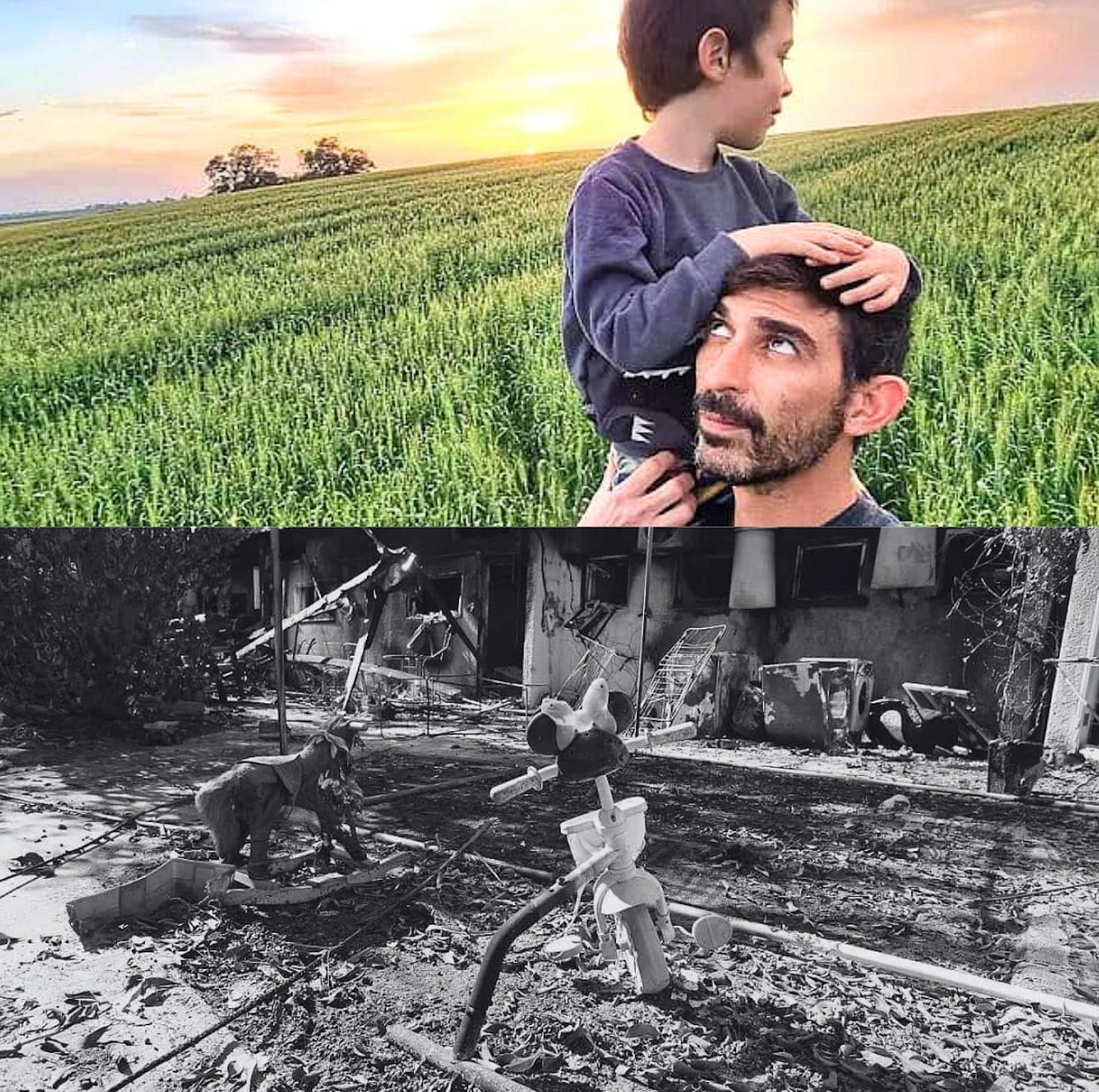The Betrayal: How Israeli Peaceniks Were Attacked By The Gazans They Fought For
Fantasies fed on rage don’t lead to liberation. They lead to destruction.
This is a guest post by Peter Himmelman, a Grammy and Emmy-award nominated rock & roll performer, visual artist, award-winning author & founder at Big Muse. He has been a proud Jew since 1959 and you can find his writings at Morning Musings.
I want to share something that haunts me. Not because I agree with it—and certainly not because I find it morally acceptable. I want to explore it because it happened, because it is real. And because it has, in a very literal sense, changed the way I see the world.
This may be old news to many, but like anything of vital importance, it must be reflected upon again and again.
On October 7, 2023, when Hamas terrorists stormed across the Gaza border and slaughtered men, women, and children in their homes, many of the victims lived in Israeli towns and kibbutzim near the Gaza Strip. These were places populated by people who, for the most part, made up the vanguard of Israel’s far left.
(Left and right in Israel differ from American definitions. The divide there is not about taxes or abortion—but primarily about whether or not to give up land for peace, and the efficacy of allowing for a Palestinian state in the West Bank and Gaza.)
Up until the pogrom of 10/7, these communities—places like Kfar Aza, Be’eri, and Nir Oz—were, at one point, and for some, models of hope. They were not anonymous cities. They were small, close-knit towns near the border where relationships had been built over time.
And that’s the part that disturbs me most—because in many of these cases, the Hamas terrorists, and Gazan “civilians” who joined in the atrocities, had been aided by other Gazans who had worked for, eaten with, and been embraced by the very people they helped target.
These weren’t spies in disguise. They were dreamers of a lurid dream—gardeners, handymen, day laborers who had shared morning coffee and pastry with Israeli families. There are accounts of them being invited into homes, exchanging stories and photos of their children, even receiving help with medical care. These weren’t strangers—they were neighbors of a kind.
I also believe—and this is the complicated part—that there was a degree of real affection. When Hannah Arendt spoke of the banality of evil, this may have been part of what she was alluding to. Either way, human beings are complex. We all are. We are multilayered. However, those of us whose minds have not been corrupted by an evil, radical ideology will not easily succumb to what happened on 10/7.
The betrayal.
These same workers, according to testimony from survivors and investigators, had provided detailed intelligence to Hamas. Who lived in which house. Who had weapons. Whether there were dogs. Who might resist. Who was vulnerable. One family’s dog—warned about in advance—was shot on entry. It was not random. It was precise. That’s what keeps me up at night.
How could someone sit across from you at a kitchen table, drink your coffee, and then mark you and your children for slaughter?
I don’t have answers. But I’ve tried to look into the dark and awful chasm of it.
And what I see—what I imagine, however murkily—is this: for some Gazans, there had been a great dissonance, one too painful to bear, one that pushed against their sense of themselves, made them feel deeply ashamed. On one side of a fence, they saw beauty: green fields, ordered lives, security, hope. On their side: overcrowding, scarcity, repression, the choking grip of Hamas, and the false promise of destroying not just what the Jews had built, but the Jews themselves.
Envy—if not the root of all evil—is surely a major contributor.
Gazans, it is impossible to know in exactly what numbers, saw the October 7 attack as the long-awaited breach. The opening of the gates. The final chapter in a story they had been told since childhood—that the land had been “stolen” from them, that the Jews were interlopers thriving on Islamic soil, and that one day they would destroy the illusory state the Jewish devils had built for themselves and return to reclaim what was theirs.
This wasn’t just about land. It was, and remains for many, a religious duty. A mythic dream. A fantasy of reversal.
If they could break through the fence—so the fantasy went—others would join. Missiles would come from Iran, from Syria, from Hezbollah in the north. The Jews would be crushed and burned. And the shame of a century or more of powerlessness would finally be avenged.
But fantasies fed on rage don’t lead to liberation. They lead to destruction. And that’s what happened—not just for the 1,500 Israelis murdered on that horrible day, and the 251 souls kidnapped by Hamas, but for Gaza itself.
What unfolded was not a revolution. It was not a war for justice. It was the bestial rape and murder of civilians, the burning of babies, the parading of mutilated women through the streets. And all of it was rationalized, praised, even celebrated, by American professors, journalists, writers, and self-described progressives—most of them living, of course, on land that had actually been stolen.
They called it “resistance.”
Some even called it “joyous.”
Osman Umarji, a lecturer at UC Irvine, said in a public lecture just weeks after the massacre: “The Zionists have been exposed for the criminals and blood-thirsty animals that they are. This is a gift from Allah to the world.” He added that events like 10/7, 9/11, and the Second Intifada were divine “reminders… waking the Muslims’ spirit.”
Bikrum Gill, a political science professor at Virginia Tech, went further, praising Hezbollah terrorism as “anti-imperialism” and a necessary “weapons production capacity that can challenge at an international scale.” He concluded: “We must refuse those who demand that we condemn Palestinian violence.”
This is what passed for moral clarity in certain corners of academia. It still does.
It was not joyous. Not for Israel, clearly. And as it turned out, not for Palestinians.
It was evil.
And still—I need to understand it, if only because the darkness of that day remains a constant shadow. I need to process it. But to understand is not to agree. It is to resist the temptation to flatten human beings into caricatures. It is to ask: How could this happen? What story had to be told—again and again—for someone to believe that betraying a friend, pointing out a child’s bedroom, or shooting a family dog could mark the beginning of freedom?
One possibility is this: like gullible children, they were lied to. Their false hopes, carefully fed. Not only by Hamas, but by an entire ethos of negation—one that seeks not to build, but only to destroy. One that elevates victimhood into virtue and turns murder into sacrament.
That story must be rejected—morally, strategically, and spiritually.
The Palestinians will never be free by killing Jews.
They will only be free when they free themselves from their eliminationist mindset. When they fully and finally reject militant, radical Islam. When they are able to choose life over death.
And when the world—especially those who claim the mantle of justice—stops applauding massacres as if they were moral victories.
Understanding motivation does not mean abandoning moral judgment.
It means sharpening it.
It means defending oneself by knowing the motivations of one’s enemies.
It means being able to hold in one’s mind a vision for true peace—
not just a cessation of war.
Follow Peter.
Email the editor: tonimaeairaksinen@gmail.com








Great piece. So well articulated. They didn’t discriminate, they killed and took hostage Asian workers as well. They were as sadistic as drunken Nazis. I’m reading ‘Saving Abigail’ by Liz Hirsh Naftali, the 3 year old whose parents were killed on October 7. Abigail was taken hostage from Kfar Azza. The same articulated there. As Golda Meir so wisely said “peace will come when they learn to love their children more than they hate the Jews”. How true it is 50 years later. There is a sick ideology in Gaza. Taught in unrwa run schools. They celebrated October 7 so I have zero sympathy for them.
Beautifully written. However, to be honest, I find your views naive and limited by the same blinders these poor folks had on when they invited their Palestinian neighbors for coffee. “The Palestinian will never be free by killing Jews” you say. The truth is nothing will change for as long as Islam is their religion. And they are not converting LOL - if you look at events happening around the world.